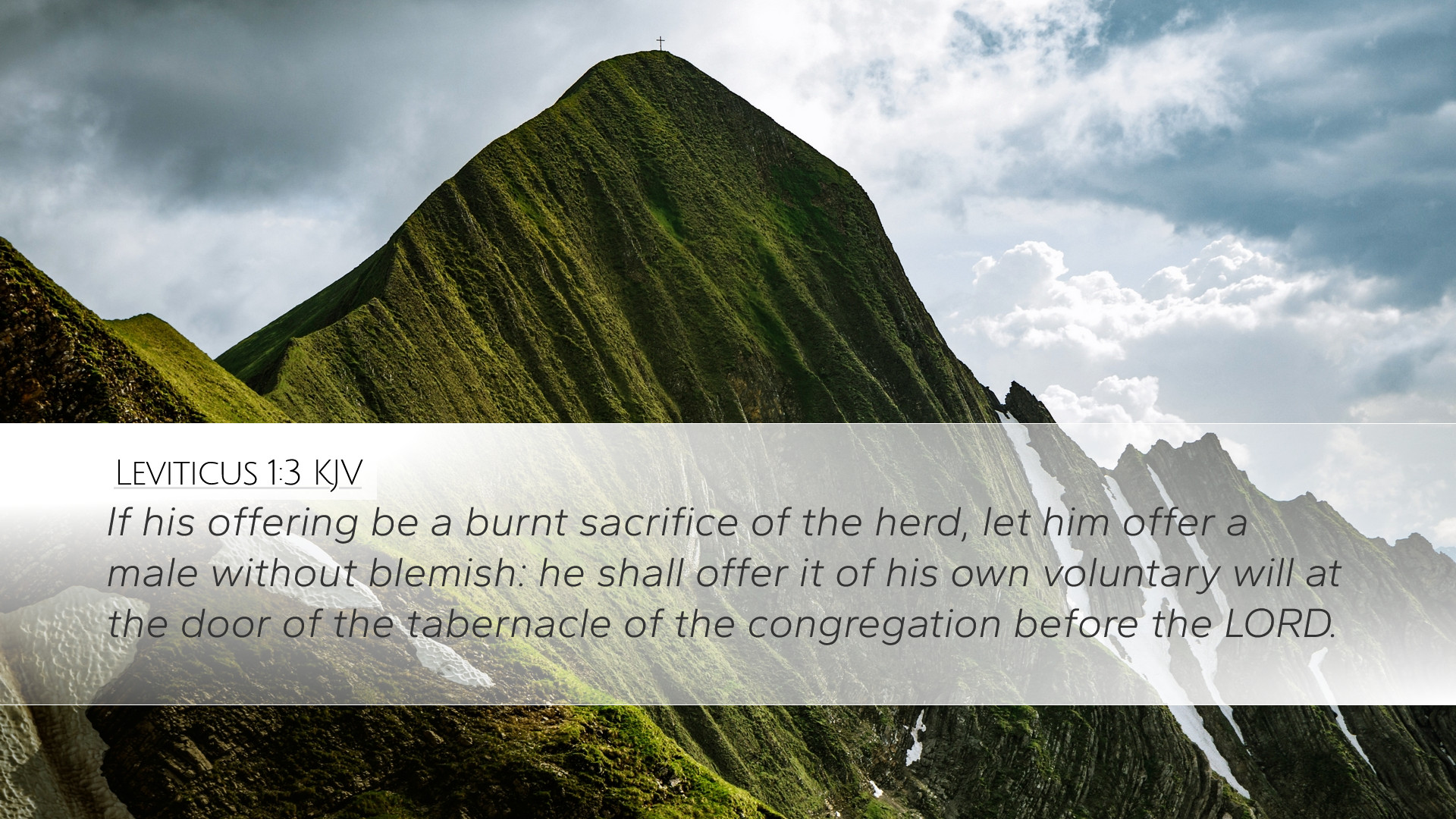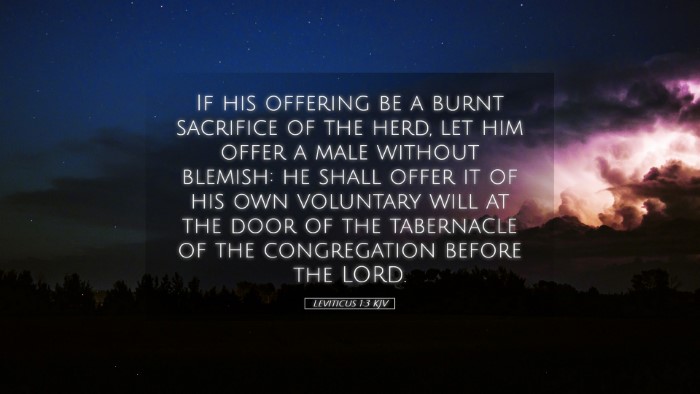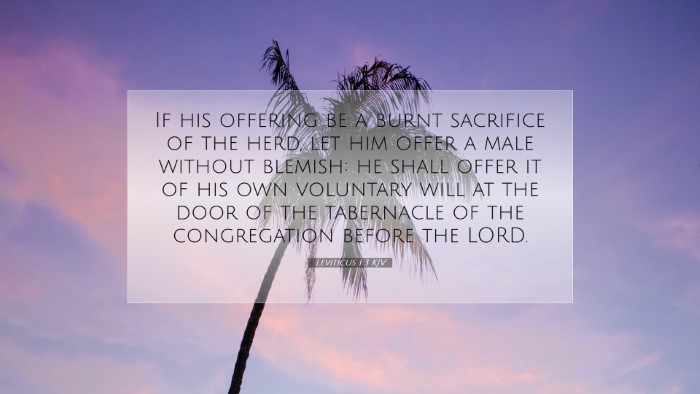Commentary on Leviticus 1:3
Bible Verse: "If his offering is a burnt offering from the herd, he shall offer a male without blemish; he shall bring it to the entrance of the tent of meeting, that he may be accepted before the Lord." - Leviticus 1:3
Introduction
The book of Leviticus serves as a critical guide for the Israelites, detailing the proper conduct and protocols for worship and sacrifice. Leviticus 1:3 plays an essential role in outlining God’s requirements for atonement and holiness through the sacrificial system. The significance of this verse lies in its instruction regarding the type of offerings acceptable to God and sets a foundational context for understanding spiritual worship.
Insights from Commentaries
Matthew Henry's Commentary
Matthew Henry emphasizes the importance of the burnt offering as a symbol of complete consecration to God. He notes that the term "burnt offering" indicates an offering wholly consumed by fire, symbolizing the full surrender of oneself to God’s will. This offering, a male without blemish, denotes the necessity for purity and perfection in what is presented to God. Henry points out that the specification of a male reflects the biblical principle that value and strength are to be offered to God.
Moreover, Henry acknowledges that all sacrificial acts are to take place at the tent of meeting, which symbolizes the presence of God among His people. This highlights the necessity of approaching God correctly to seek acceptance. Such requirements establish the seriousness of sin and the need for atonement, which leads to the ultimate sacrifice of Christ that fulfills these early rituals.
Albert Barnes' Notes on the Bible
Albert Barnes also elaborates on the specifics of the burnt offering in Leviticus 1:3. He emphasizes that the expression "without blemish" serves a dual purpose: it signifies the standard that God expects from His people and prefigures the sacrifice of Christ, who is the epitome of perfection. Barnes draws attention to the aspect of bringing the offering to the “entrance of the tent of meeting,” signifying that the approach to God must be respectful and in accordance with His statutes.
Barnes points out that the act of “offering” symbolizes an active participation in worship and the necessity for the individual to engage in the sacrificial system as a means of obtaining divine favor. He suggests that this practice was not only central to the worshiper’s experience but also to the national identity of Israel as a people called to holiness.
Adam Clarke's Commentary
Adam Clarke expands on the implications of the offerings stated in Leviticus 1:3. He notes that the phrase “accepted before the Lord” reflects the theological understanding that acceptance is contingent upon the individual's posture before God—both literally in terms of the act of sacrifice and spiritually in terms of the heart’s intention. Clarke intricately discusses how the specifics of offering—a male without blemish—illustrate the criteria for approaching God and the reverence required in the relationship.
Clarke also highlights that in the context of Israel’s worship, these offerings were not merely ritualistic but were imbued with deep spiritual importance, intended to foster a relationship between God and His people. He stresses that these sacrifices prefigure the ultimate sacrifice of Jesus Christ, which ultimately fulfills the Law through His blameless offering.
Theological Implications
Leviticus 1:3 teaches vital theological truths that remain relevant for believers today:
- Holiness of God: The meticulous requirements for the offering illustrate God’s holiness and the seriousness of sin.
- Consecration: The act of offering a burnt animal emphasizes total surrender and dedication to God.
- Foreshadowing of Christ: The need for a perfect sacrifice foreshadows Jesus Christ, who fulfills the role of the ultimate sacrifice for sin.
- Acceptable Worship: The proper approach to God in worship signifies the importance of reverence and fidelity in our relationship with Him.
Practical Applications
For pastors, students, and scholars, the insights gleaned from Leviticus 1:3 can serve as a profound basis for the exploration of worship practices and theology of sacrifice today. Some practical applications include:
- Examination of Heart: Believers should reflect on their intentions and the quality of what they bring before God in worship.
- Value of Sacrifice: Understanding the cost and importance of sacrifice in their journey of faith can lead to deeper spiritual growth.
- Teaching Holiness: The church should actively teach the importance of holiness and purity in worship, mirroring the standards God set forth in the Old Testament.
- Christ as Fulfillment: Highlighting Jesus as the fulfillment of the sacrificial system in preaching aids believers in understanding the continuity of God's plan for redemption.
Conclusion
Leviticus 1:3 is more than a mere instruction; it is a theological declaration that informs our understanding of atonement, worship, and the profound holiness of God. The insights drawn from the commentaries of Matthew Henry, Albert Barnes, and Adam Clarke reveal multidimensional truths about God’s requirements in our approach to Him, reminding us of the significance of purity, the essence of sacrificial love, and the ultimate sacrifice that Christ made for all. This passage continues to challenge us to bring our best to the Lord—our hearts, worship, and lives—as an expression of our faith and gratitude.


